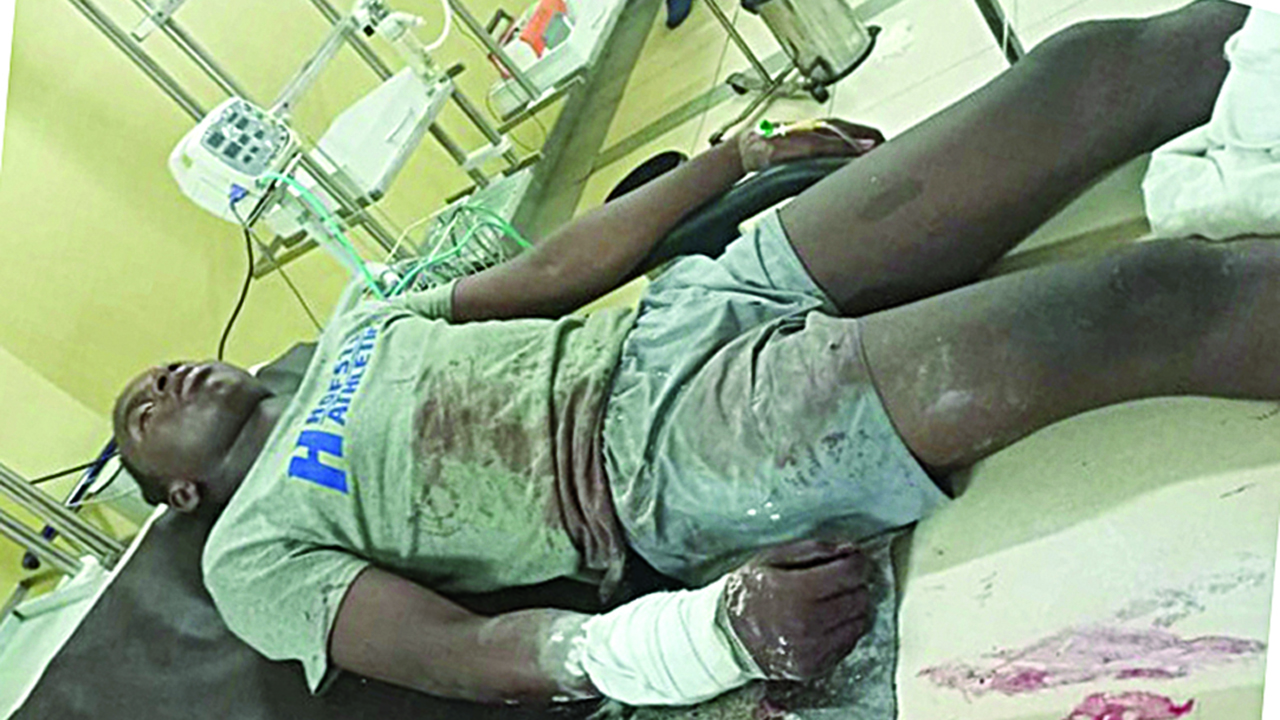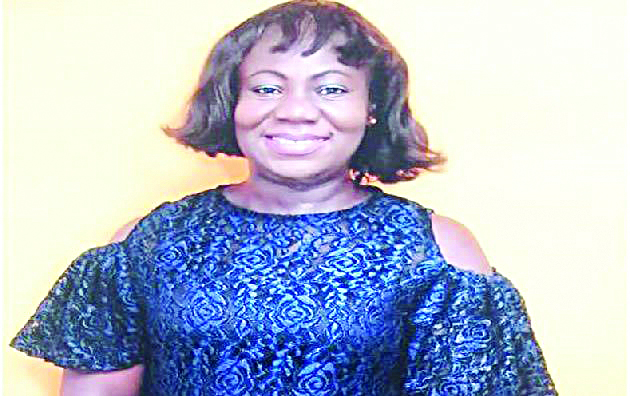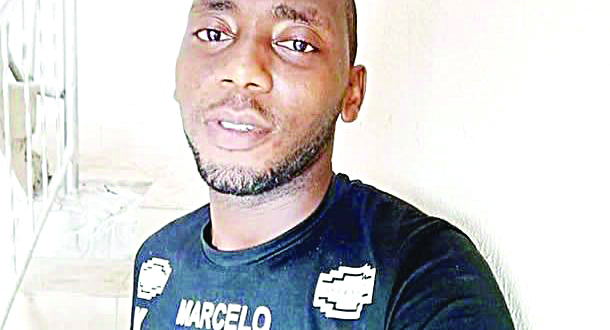
Giving the details of how Oluyede died, an eyewitness and neighbour simply identified as Ify said: “We were at the shop when we suddenly heard a gunshot. But when I stepped outside, I could not trace where the sound of the gunshot came from. Suddenly, we saw Uduak bleeding as she ran into my shop and said we should rush her to a hospital.
“I was shocked and could not drive, so, I pleaded with my mechanic who was around to drive her to a nearby hospital where they stopped the bleeding. The doctor said the case was beyond them and referred us to the Randle General Hospital. When we got there, they demanded for a police report, and for her husband to sign an undertaking. So, I quickly rushed to the Aguda Police Station on Soloki Street and pleaded with policemen to follow me to the hospital so that treatment of the victim could commence.
“A policeman was writing the report in the car as I rushed back to the hospital. By the time we got there, she had been placed on drip and oxygen, but sadly, she died.”

To date, many Nigerians with gunshot wounds are still dying in hospitals because of the non-presentation of Police reports.
But in spite of all the legal provisions compelling treatment of gunshot victims, medical practitioners’ failure to comply with these provisions led to the death of Precious Owolabi from gunshot injuries, on Monday 22, 2019, while covering the clash between Nigeria Police Force, and members of the Islamic Movement in Nigeria (IMN). He was a member of the National Youth Service Corps (NYSC) serving with the Abuja office of Channels Television.
He finally died after several hospitals allegedly rejected him for failure to produce a police report.
It was the same story for Beatrice Popoola, who was gunned down on the eve of her wedding, by armed robbers at Maryland Bus Stop, Lagos.
Also, in 2021, a businessman, Anthony Igwe, who lived in the Adeniyi Jones area of Ikeja in Lagos, died of gunshot injuries because after he was rushed to one of the hospitals in Ikeja, the doctors demanded a police report and N200, 000 deposit before treating him.

His neighbours, who rushed him to the hospital immediately deposited the money, but the doctors stood their ground that a police report must be produced. He died before friends and family could obtain a police report from Area F, Ikeja, Lagos.
Another victim was Odiri Onosigho, who was shot by armed robbers at First Gate Bus Stop, Festac, Amuwo Odofin Local Council, in 2021, but rejected by hospitals that he was taken to because there was no police report.
Denying victims of stabbing/gunshot treatment for failure to tender police reports is traceable to the civil war when there was a proliferation of firearms and armed robbery cases across the country. As a result, the Robbery and Firearms (Special Provisions) law was passed.
The law said it shall be the duty of any person, hospital or clinic that admits, treats, or administers any drug to any person suspected of having bullet wounds to immediately report to the police.
It also stated that the person who contravened the law will be liable to imprisonment for a term not exceeding five years; and in the case of a hospital or clinic, to a fine of N10, 000 while the hospital or clinic would be closed.
In 2017, Buhari signed the “The Compulsory Treatment and Care for Victims of Gunshots Act, 2017,” which makes it an offence for hospitals to deny gunshot casualties treatment for lack of police report.
The law, which, however, stipulates that a formal report should be provided within two hours of commencement of treatment, adds that treatment should commence with or without payment immediately, just as it frowns at the degrading or torture of gunshot patients by the authorities.
The Act further provides that it is the “duty of any person, hospital or clinic that admits, treats or administers any drug to any person suspected of having bullet wounds to immediately report the matter to the police.”
Similarly, the National Health Act 2014, in Section 20, maintains that a health care provider, health worker, or health establishment shall not refuse a person emergency medical treatment for any reason, and anyone that goes against the law is liable to a fine of N100, 000, a jail term of six months or both, upon conviction.
Following the widespread outcry over the refusal to treat persons who suffered from a gunshot, in 2015, a former Inspector-General of Police, Solomon Arase, issued a statement, asking police officers to desist from harassing good-hearted Nigerians that help convey gunshot victims to medical facilities.
He also mandated medical practitioners to treat victims first before taking any other action.
A resident of Lagos State, Adeola John, said that the government must find a way of enforcing the treatment of gunshot victims before police reports are presented as contained in the law because passersby sometimes feel unperturbed about the plight of victims due to this.
“There was a day that armed robbers attacked some people on the Mile 2 bridge. One of those attacked had a gunshot injury, but after the robbers left, people were just looking at the man without making any effort to evacuate him to the hospital. He begged the passersby and onlookers not to allow him to die, but many said they were afraid of what they called ‘police trouble’.”
Examining the issue, a medical doctor, Akintayo Adebayo, said the intention of the law that demands compulsory treatment for gunshot victims without police report remains a good one.
“However, I don’t think there was sufficient, inclusive stakeholders’ engagement before the bill was signed into law.”
According to Adebayo, there are so many intricacies involved in the management of gunshot injuries, particularly in a society where gun control and licensing has not been effectively monitored and evaluated.
“The proliferation of arms occasioned by illegal smuggling of firearms and ammunition has been debated in several fora, but all-inclusive stakeholders engagement has not been properly explored,” he said.
He maintained that doctors have a duty to care for, and to attend to all emergencies without bias. However, there are lots of medicolegal engagements that must be practically sorted out. An example is the issue of confidentiality and general data rules regarding data protection and data sharing. A patient may not be favourably disposed to report as a case of gunshot injury after he has been treated at the hospital. Therefore, the onus may be referred to the attending physician who may be breaching the confidentiality clause if a signed, and informed consent of the patient has not been secured.
“I must also admit that it is very difficult to establish the immediate, or remote causes of gunshot injuries, including establishing whether the gunshot injury was as a result of the communal clash, cult-related activities, banditry, an armed robbery attack, or even a case of suicide?
“There is also the case of who pays for the treatment? What are the considerations for disability-adjusted life years occasioned by gunshot injuries? In summary, knee-jerk approach, or desktop legislation cannot effectively address all these hanging issues,” Adebayo stated.
He added that strategic and all-inclusive stakeholders’ involvement would be required to arrive at sustainable solutions to this public health threat.
For Dorcas Tonade, a dental surgeon, hospitals are still demanding Police reports before admitting and treating persons with gunshot injuries because the law is not effectively implemented.
She suggested the creation of an agency with toll-free lines, where members of the public can register details of gunshot victims for record purposes. Sympathisers and family members of these victims can also locate the whereabouts of their loved ones by relying on the repository of the agency.
The Chairman, Lagos State Chapter of the Nigerian Medical Association (NMA), Dr. Adetunji Adenekan, said that any hospital or health worker that rejects or refuses to treat gunshot victims was going against the law.
“However, there is a clause that says that within two hours or so, the health worker should report to the nearest police station, anyone that presents with such case. This could constitute part of the delays because police officers could start harassing concerned health workers by alleging that two hours have elapsed since the case was reported.
“So, if you have a patient that you have taken in as an emergency, and you do not know how long the stabilisation process will take, it cannot be the same health worker that is trying to stabilise the patient that would be required to make the report,” Adenekan explained.
He, however, added that a lot of confusion usually arises in “emergency care because most of the people who render this service (especially private hospitals) often feel that once they use a lot of their resources and consumables to take care of emergency patients, they need to be paid immediately to facilitate replenishment. Once this does not happen, there will be issues because as private hospitals, they must simply restock.”
Even though saving lives is one of the foremost duties of a doctor, Adenekan asked, “when he saves these lives and the patients cannot pay, how does the hospital get the resources to save another life that is in a critical condition? Sadly, the basic healthcare provision fund, the National Health Act, which provides for such hospitals to be reimbursed, is yet to kick off. I feel that is one of the problems, but there are hospitals that are doing the right thing.”
On how the NMA is galvanising its members to help gunshot victims, Adenekan said the NMA Lagos State Chapter, routinely educates its members on key issues around treating gunshot victims, negligence, and medical practices.
Lagos State government was contacted on what it is doing to ensure compliance with the Compulsory Treatment and Care for Victims of Gunshots Act, 2017 in order to prevent avoidable deaths, but the Director, Public Affairs, Ministry of Health, Tunbosun Ogunbanwo, did not respond to calls and a message sent to him.
Deaths mount as lax enforcement of victims of gunshots act persists

Late Onosigho
Late Onosigho


